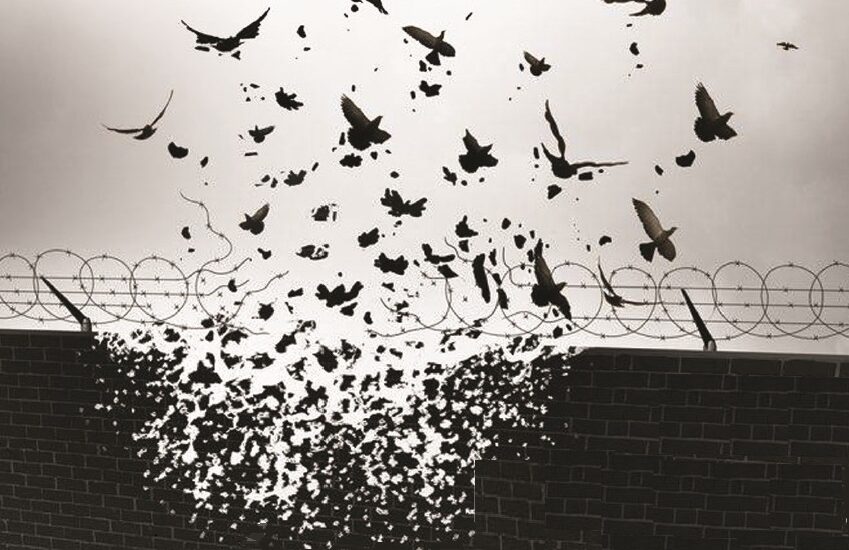
On June 2, Dalhousie University School of Nursing Doctoral students Martha Paynter, Keisha Jefferies and Leah Carrier released a statement “Nurses for Police and Prison Abolition” in response to racist police brutality across Canada and the United States. Since that time, the statement has been translated into French, Spanish and German, and signed 1000 times.
“Nursing has a long history of complicity in exclusion, oppression, and exploitation of BIPOC. Changing that course requires abolitionist action, and the 2020 International Year of the Nurse and Midwife should be devoted to that change.”
Nurses must join the movement for police and prison abolition. The twinned crises of COVID-19 and police brutality against Black, Indigenous and people of colour (BIPOC) in North America in spring 2020 make clear that for nurses to follow our Code of Ethics, to promote justice, foster health, and prevent harm, we must advocate for an end to racist systems of policing and criminalization. Nursing has a long history of complicity in exclusion, oppression and exploitation of BIPOC. Changing that course requires abolitionist action.
Reforming policing or prison systems, attempts to make either of them incrementally better, wastes effort that must be directed to radical change. Inhumane systems cannot be made better. Nursing is political and we as nurses must engage with the political demands of abolitionism. We must answer the radical call. While it is radical in this moment, it is foundational, vital, and urgent that nursing do this work. Advocacy is our job.
The super-acceleration of COVID-19 in prison spaces is causing whole societies to question the acceptability and necessity of these institutions. The horror of prisons – isolation, restraints, infection, injury – is borne disproportionately by those on the margins. Too many prisoners are BIPOC, most are victims themselves of physical and sexual abuse, and most are poor, inadequately housed, unemployed, and unwell. Prison is a bastion of the racist and colonial practices that nursing itself needs desperately to renounce. To seek care while in prison requires compliance with traumatizing security protocols- strip-searching, observation, violations of confidentiality. It is no coincidence that prisons disproportionately affect BIPOC – prison is part of a system that was not designed for safety but rather to control, oppress and segregate.
Police across Canada disproportionately target and harm BIPOC. When called to respond to mental health crises, police have killed. During the COVID-19 pandemic we lost D’Andre Campbell and Regis Korchinski-Paquet when police were called as first responders to attend to health matters. Health is not a matter for police.
The police and prison goals of punishment and control conflict with nursing aims to treat, care for, and promote self-governance of body and health. The consequences of policing and prison, including increased risk to BIPOC of homicide, suicide, and death, challenge the effort of nursing at its core. We will not have our work undone by police and prison systems. We as nurses are responsible for care. To care for our communities, to advocate for justice and safety, we must abolish police and prisons.
Abolitionism aims both to prevent the growth of policing and prisons as well as the adverse health outcomes of criminalization. In this pandemic we have witnessed the release of tens of thousands of prisoners, including the halving of the Nova Scotia incarcerated population, while also seeing increased policing of orders to stay at home. Nurses must champion police defunding and decarceration as appropriate responses to minimize disease transmission while also resisting the criminalization of illness and the transformation of public health actions into policing. Abolition is fundamentally about imagining a different way of addressing the structural determinants of harm. We must learn abolition as a nursing intervention. We must use our strength in voting numbers. Our professional organizations, employers and unions must end partnerships with police. And we must lead in development and adoption of non-punitive, trauma-informed support for people in crisis.
Nurses are one of if not the largest workforce in North America. We are held in extraordinary esteem- especially now, as the frontline heroes of COVID-19 response. We will use this leverage to demand an end to police and prison systems and to create alternatives that support accountability without violence, deprivation, and death.
No amount of investment – such as for equipment, training or staff – will reduce the harm of policing and prison. These investments increase the acceptability of police and prisons and result in increases in criminalized populations. As nurses we recognize that inadequate investment in actual treatment for trauma and in guaranteed basic income to remedy poverty and homelessness is what drives the process of criminalization. We call for spending in communities, in health promotion and social services, and not inside police departments and prison walls.
We are nurses for abolition now!
Signed,
Martha Paynter RN PhDc, Dalhousie University School of Nursing
Keisha Jefferies RN PhDc, Dalhousie University School of Nursing
Leah Carrier RN PhD Student, Dalhousie University School of Nursing
With a special thanks to our generous donors who make publication of the Nova Scotia Advocate possible.
Subscribe to the Nova Scotia Advocate weekly digest and never miss an article again. It’s free!



